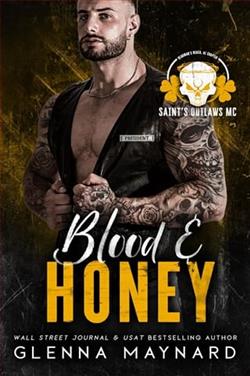Page 28 of Four Live Rounds
“What?”
“Hills.”
“What does that mean?”
“—ine Hills.”
“The ing hills?”
“Wolverine Hills.”
“Wolverine Hills?”
He nodded.
“Where’s that?”
The young man coughed up a mouthful of blood, moaned, “Please.”
“What’s his name? The guy who got out of the plane.”
His eyes grew more distant, like someone had pulled down the shades.
“Was this the last exchange, or was that man going to deliver me to someone else? I need to—”
He let out a long exhalation and the muscles in his neck and back relaxed. He drooped forward. Kalyn touched the side of his neck. She came to her feet, surveyed the scene—three bodies in the wilderness and darkness falling.
THIRTY-TWO
Will and Devlin walked into the rich-smelling coffee shop that doubled as an Internet café, waited impatiently for a computer, staring at the bizarre series of photographs that adorned the walls—black-and-white images of mating caribou. A college kid was setting up on the stage against the back wall, adjusting the levels on his amp and tuning an acoustic guitar. It was already dark outside, and Will was on the verge of ordering someone off a computer when one opened up.
He and Devlin shared a chair at one of the Macs. The connection was maddeningly slow, and it took five minutes for SoniyaMobile’s Web site to load. It had been three days since Kalyn had made him memorize her log-in ID and password. He remembered her ID immediately, but her password was alphanumeric, and it took him five tries to get it right.
When the Google map finally loaded, he said “Fuck” loudly enough for the patrons seated at adjacent computers and nearby tables to glance over and shoot him dirty stares.
Devlin said, “Oh no.”
The little icon representing Jonathan’s truck was already in northern British Columbia.
“He’s going home,” Will said. “Already delivered her to the buyer.”
“Is she dead?” Devlin whispered.
“Stop asking me that,” he replied, his words sharper than he intended.
The acoustic guitarist was now crowding a mic stand, strumming his guitar, and introducing what he described as experimental–hip-hop–folk.
“Trace it, Dad.”
“What?”
“You can see where all Jonathan’s truck has been. Here, I’ll do it.” She grabbed the mouse and moved the cursor up to the command menu. As she clicked on VIEW TRACKING HISTORY, Will’s cell phone rang. He pulled it out of his pocket, stared incredulously at the display screen.
“Who is it?” Devlin asked.
“I don’t recognize the number.”
He hit TALK. “Hello?”
“Will?”
“Shit, Kalyn, are you okay?”
“Where are you?”
“Fairbanks, Alaska.”
“Where in Fairbanks?”
“This coffee shop near the university. The Last Drop.”
“I’m ten minutes away. Stay put.”
Will closed the phone and stared at his daughter in disbelief.
Devlin began to cry.
Scars
THIRTY-THREE
Will and Devlin stood shivering outside the coffee shop, preferring the cold of the Alaskan night to the earnest warbling of the guitarist inside. At last, a black Suburban pulled into the parking lot, Kalyn grinning at them through what remained of the driver’s side window—tinted jags of glass.
She got out, and Will and Devlin walked over, embraced her.
“I’m so sorry,” Will whispered in her ear.
“Hey.” Kalyn framed his face with her hands. “I’m all right. Let it go.”
“What happened to you?”
“Let’s swap stories later. Right now, I want you to follow me. I have to ditch this car. It’s full of glass and blood.”
Will followed the Suburban for several miles through the heart of Fairbanks, coming at last to a Safeway. Kalyn parked in a far corner, spent five minutes wiping everything down—the steering wheel, doors, gearshift—anyplace she might have left fingerprints or sweat, skin cells or hair.
Then she climbed into the front passenger seat beside Will, said, “I’ve got a room at the Best Western. Head back the way we came.”
As Will pulled onto the Alaska Highway, Kalyn noticed the remains of the computer on the floorboard. She lifted a piece of the shattered keyboard, turned it over in her hand.
“That happened this morning outside of Whitehorse, Yukon,” Will said. “A moose was standing in the middle of the highway. I had to slam on the brakes to avoid hitting him, and the computer launched into the dashboard. We were trying to track Jonathan’s truck at the coffee shop when you called.”
“It was my fault,” Devlin said. “I was talking to Dad to keep him awake. I should have been holding on to the computer tighter than I was.”
Kalyn glanced into the backseat, reached out for Devlin’s hand. “Not your fault, baby,” she said. “Some things—they just happen. Nothing we can do.”
“So what happened to you?” Devlin asked.
“Jonathan turned me over to three men this afternoon at a warehouse, somewhere in Fairbanks. They drove me out into the countryside, to this lake. I was able to get away.”
By the way she said it, Will knew. “You mean you killed them.”
“Yeah.”
“Three men? How?”
“They made a mistake. Cuffed my hands in front of me instead of behind my back. If they’d done that, it would’ve made it impossible for me to do what I did. Or at least much more difficult. Also, they underestimated what I was capable of.”
“Who were they?”
“I’ve been trying to work that out. Seemed like muscle for organized crime.”
“There’s an Alaskan mob?”
“Probably an offshoot of an Anchorage syndicate. Turn up here.”
Will took the next exit onto S. Cushman, saw motel, hotel, and restaurant signs glowing in the distance.
“They were definitely delivering me to someone,” Kalyn said. “While I was dealing with them, a floatplane landed on the lake, came up to the pier. This man got out, saw that something had obviously gone wrong, and hauled ass out of there.”
“You find out where he was going?”
“I questioned one of the men before he died, but the only piece of information I got was a place called the Wolverine Hills. You heard of it?”















